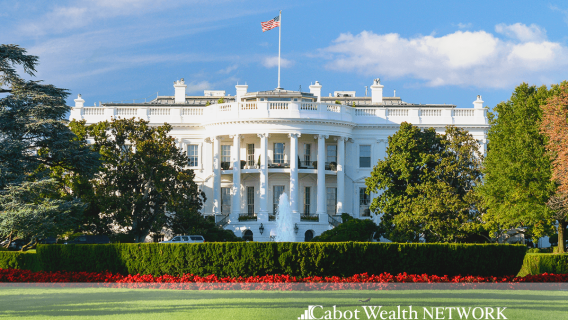It’s another Presidential election year, and if you’re like me you find it both exhilarating and exhausting as campaign seasons have extended to such a point that it seems we almost get no time off anymore.
Don’t get me wrong. I was a government major in college, and I find the process of how we govern ourselves fascinating. But I still envy our friends in Europe where Parliamentary elections tend to run for more like six or eight weeks. That sounds nice.
If you read my columns regularly you know I avoid getting into politics. It’s not that I don’t have political views. I do. It’s just that politics doesn’t really have much to do with good investing. Markets are more driven by the economy, global events (think wars, pandemics, oil embargoes, etc.) and inflation than the party in power.
We have had strong markets under administrations of both parties, and there is almost always money to be made in the stock market in almost any situation if you look in the right places.
I feel strongly enough about this that, as a general rule, when I hear people who claim to be investing experts go off the deep end about political developments I tune them out completely. They undermine their credibility as investment analysts with their political rants.
But there are some instances where investor interests overlap with the political world. I’m writing about one of those today, and that is the business of members of Congress, senior members of the Executive branch, and members of our Supreme Court trading stocks.
There are two primary problems with these government officials owning individual stocks.
The first is the obvious conflict of interest that can arise, and the obvious appearance of conflict of interest that does arise, when a member of Congress is making laws that affect a company in which they have an ownership stake. Are they doing what is best for their constituents and our country? Or are they promoting their personal financial interests?
The same applies when members of the Supreme Court are being asked to rule on a case that could have implications for a company or industry in which they hold stock. And obviously, the President and Vice President, as the leaders of the Executive branch have direct oversight of regulatory developments and enforcement.
Our claim to be a country of rules and laws needs an asterisk as long as we continue to permit the leaders of our government to remain in a conflicted position where they have the ability to put their financial interests ahead of the interests of the country.
And that becomes relevant to the rest of us investors because we may hold shares in competing companies, or other sectors, that are getting short-changed as a result of a conflicted government official’s actions.
Decorum and norms have kept this from being the kind of issue it is in China where government officials picking winners and losers can have sudden and drastic implications for companies. But as we know, we are in a period in politics and government where norms fall by the wayside on seemingly a daily basis, so it seems foolish to count on that to protect us.
The second reason our government leaders should not be permitted to trade individual stocks is the possibility of insider trading. If you’re paying attention closely you might say, “But what about the Stop Trading on Congressional Knowledge (STOCK) Act of 2012? Didn’t that take care of that problem?”
The STOCK Act was passed and signed into law by President Obama in 2012 and it prohibits the use of non-public information for private profit by members of Congress and other government employees. That does sound like it addresses the problem, but it remains an open question nonetheless.
While the STOCK Act banned insider trading, as the following chart shows, members of Congress are still getting stock market returns that are FAR above the market average. The following chart shows the approximate total returns for the top Congressional investors:
Pretty good! If they’re such good investors, it’s not clear why they keep their day jobs. Or perhaps it is.
I don’t want to accuse anyone of anything. They may have just gotten lucky or had a great year. But that’s the point. We don’t know how they did what they did with their investments. Trading on insider knowledge is certainly a possibility. Just ahead of Silicon Valley Bank crashing, some members of both House and Senate committees that oversee the financial industry sold their SVB shares. Isn’t that fortunate timing?
And to slightly sidetrack for a moment, insider trading is not a victimless crime. When you buy based on insider knowledge you deprive someone else of the profit that they would have made. On the other side, when you dump a stock on insider knowledge, you stick someone else with the loss you would have otherwise endured. The victims don’t necessarily have any idea they are victims, but they are victims nonetheless. That may be obvious to many but I do still hear it from time to time, so I thought it worth clarifying.
Importantly, this issue of government officials trading individual stocks is something about which there is extensive and bipartisan agreement. And we don’t like it.
A University of Maryland survey released a year ago found the following:
Do you favor or oppose prohibiting Members of Congress and family that lives with them, from trading stocks in individual companies. (They would still be allowed to buy or sell shares of mutual funds or index funds.)
Favor
Overall – 86%
Republicans – 87%
Democrats – 88%
Independents – 81%
Very Red Congressional Districts – 85%
Very Blue Congressional Districts – 85%
Do you favor or oppose the proposal is [sic] to prohibit the President, the Vice President, and Supreme Court Justices from trading stocks in
individual companies?
Favor
Overall – 87%
Republicans – 87%
Democrats – 90%
Independents – 82%
Very Red Congressional Districts – 89%
Very Blue Congressional Districts – 88%
That’s pretty remarkably high approval with only extremely minor partisan variation. These days it seems hard to get 87% agreement about anything.
Cabot Wealth Network is here to help you be a better investor, not for policy advocacy, so I’ve waded into these waters with extreme caution. But, this is a matter that should be of concern to all investors because it affects the potential returns of your investments. So I wanted to let you know. And if you happen to be in a conversation with an elected official, let them know your view, and that this is an important issue for you – and most Americans.
Yours for more successful investing,
[author_ad]


